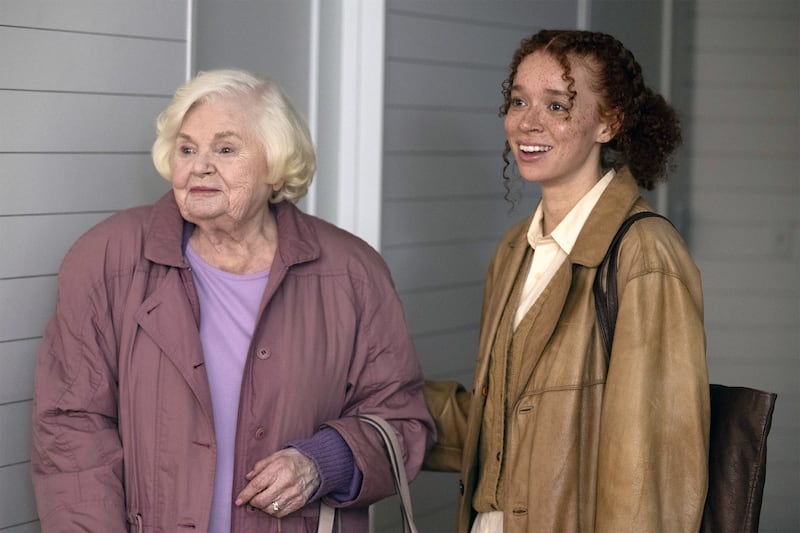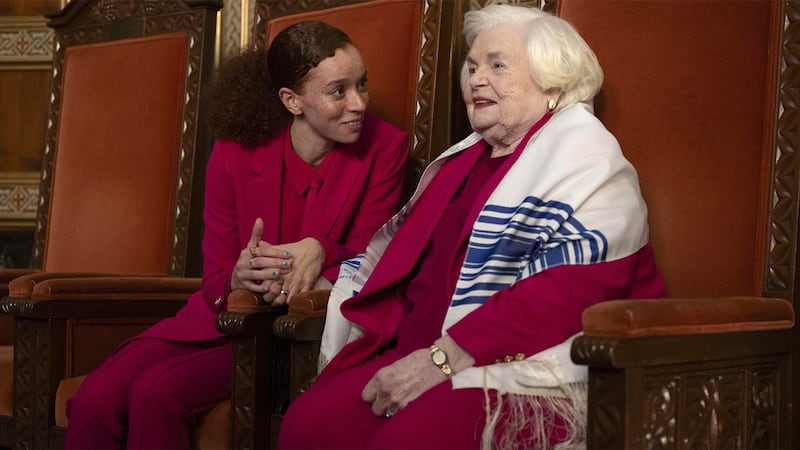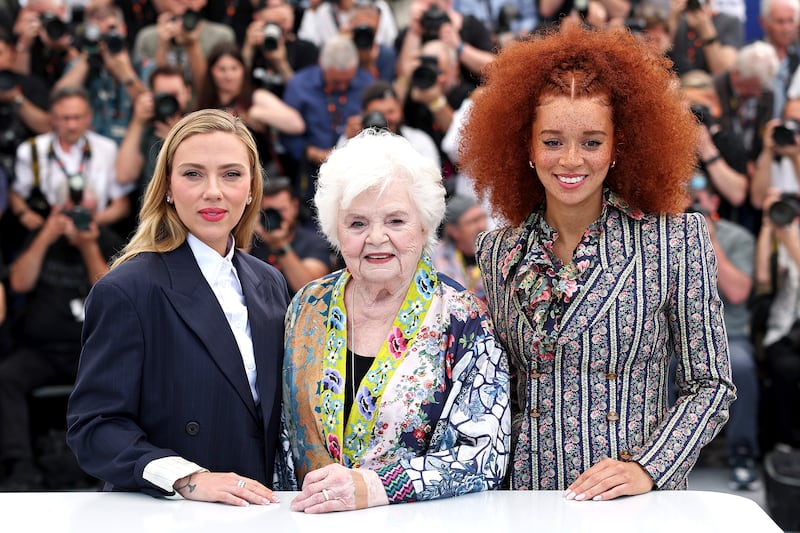At 95 years old, June Squibb continues to be an actress of tremendous charm, although her irresistibility is put to the test (and then some) by Eleanor the Great.
The story of a woman who does an unthinkable thing and is subsequently absolved of her sins by narrative contrivances and screwy logic, Scarlett Johansson’s directorial debut—which just showed at the Toronto International Film Festival ahead of its Sept. 26 theatrical debut—is a misguided wannabe-uplifting saga about grief, forgiveness, and keeping important memories alive.

Squibb may be as great as always, but this wrongheaded Holocaust variation on Dear Evan Hansen fails to live up to her character’s nickname.
Awaking at 5:45am, Eleanor (Squibb) exclaims to her roommate and lifelong best friend Bessie (Rita Zohar) that they’ve overslept. Fortunately, they still have plenty of time to accomplish the day’s tasks, which include donning orthopedic sneakers and visors, taking a walk through their Florida community, soaking up the sun on a boardwalk bench overlooking the ocean, and going grocery shopping at the same store they’ve frequented for the past 16 years.
There, with sarcasm so thick it practically drips off her tongue and pools at her feet, Eleanor demonstrates her feistiness by telling a young clerk to check in the back for Bessie’s favorite pickles. Bessie is no wallflower either; when the man behind the deli counter says that the duo should smile more, she responds without a moment’s hesitation, “Hitler took my smile!”
That remark reveals that Bessie is a Holocaust survivor, just as Eleanor’s decision to chime in—followed by another man’s retort that Eleanor didn’t survive Hitler’s Final Solution—marks her as a habitual liar. Nonetheless, Eleanor the Great believes in deceit in service of the greater good, and so too does Eleanor, who continues to be less than honest when she consoles a hospitalized Bessie by reassuring her that she’ll be okay.

After Bessie’s funeral, Eleanor is forced to move home to New York to be with her recently divorced daughter Lisa (Jessica Hecht) and her grandson Max (Will Price). At least there, she’s comfortable being brutally honest, whether she’s ribbing an Uber driver for hailing from Staten Island (“My condolences”) or telling Max that his mother’s nickname used to be “the class mattress.”
Eleanor is a mixture of candor and insincerity, and bored out of her mind in her daughter’s Manhattan apartment, she takes Lisa’s advice and tries out a singing class at the local JCC. It’s not to be, yet on her way out of the building, she helps a stranger and, for her trouble, is invited to join a support group.
Eager for friends, Eleanor accepts and winds up sitting in a circle with Holocaust survivors who are processing their weighty traumas. When, as the newest attendee, she’s asked to share her experiences, Eleanor opts not to confess that she’s there by mistake but, rather, to begin telling Bessie’s story as if it were her own.

This endears her to the strangers and, additionally, to Nina (Erin Kellyman), an NYU sophomore who’s thinking of writing an article about these individuals and takes a particular interest in Eleanor.
It goes without saying that Eleanor’s ruse is categorically, offensively wrong, and over the ensuing weeks, she keeps perpetrating it with Nina, with whom she becomes friends. Nina joins Eleanor at synagogue, where the widow crashes bat mitzvah’s each Saturday morning (and decides to have her own), and she slowly opens up to the senior citizen about being half Jewish on the side of her mother, who recently passed away.

Thus, the two are bonded by loss and sorrow, and to make matters even neater and tidier, they both have relatives who refuse to engage with them on an emotional level: For Eleanor, it’s exasperated Lisa, who wants to put her in a retirement community; and for Nina, it’s her TV news reporter dad Roger (Chiwetel Ejiofor), who’s grown distant and distracted since his wife’s death. Everyone is sad and lonely and looking to be heard, and for better and worse, Eleanor’s tale of WWII woe is met with receptive ears, to the point that she quickly finds herself in the spotlight.
By having its protagonist commit an unpardonable fraud, Eleanor the Great deliberately backs itself into a corner that it must invariably escape. Tory Kamen’s script, however, strains in vain to justify the woman’s actions. Eschewing comedy, which might have posited the proceedings as a high-wire lunatic farce (à la The Producers), the film instead strives for tears-inducing pathos, asking audiences to deeply empathize with Eleanor and Nina’s anguish.
Demanding to be taken seriously, it stymies any chance of excusing Eleanor’s misdeed as just a misguided bit of lunacy. In short, the more we’re meant to feel Eleanor’s suffering, the graver and uglier her deception becomes.
To remedy this situation, Eleanor the Great ultimately contends that Eleanor did what she did because she missed Bessie and wanted her horror story—which Bessie herself recounts in a moving kitchen-table flashback scene—to be told.
Preserving the memory of the Holocaust is unquestionably a noble goal. Yet for all her supposedly virtuous intentions, Eleanor is a charlatan and her first-hand testimonial is akin to stolen valor, and no matter how many manipulations it perpetrates, Johansson’s film can’t escape it. Still, it certainly tries during a third act which leans heavily on the idea that Eleanor was just attempting to cope with her grief—a notion undercut by the fact that, at outset, she was outed as a chronic pretender.
Johansson’s direction is unremarkable, as is a Dustin O’Halloran score that resorts to tender piano twinkling. The only thing that prevents Eleanor the Great from being an outright nauseating affair is Squibb, who casts Eleanor as a three-dimensional person even amidst a raft of silly, unbelievable, and distasteful twists and turns.
With considerable charisma, she almost makes Eleanor appear to be as much a victim as those whose trust she’s betrayed, feelings she’s hurt, and experiences she’s dishonored—although in the final tally, almost isn’t nearly good enough.
The post Scarlett Johansson’s Utterly Bizarre Holocaust Memorial Drama appeared first on The Daily Beast.




